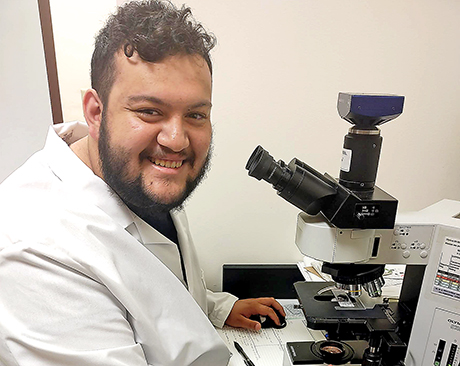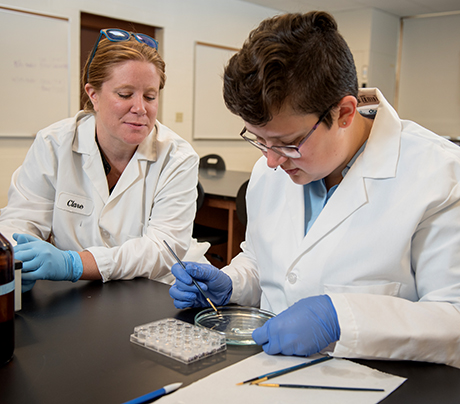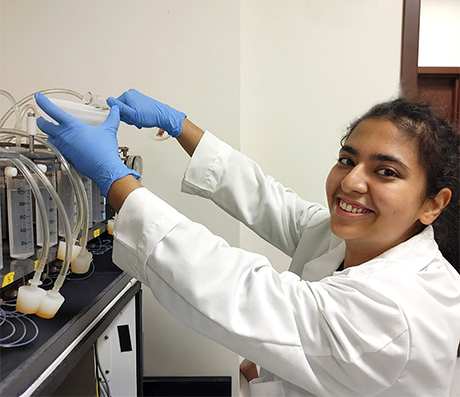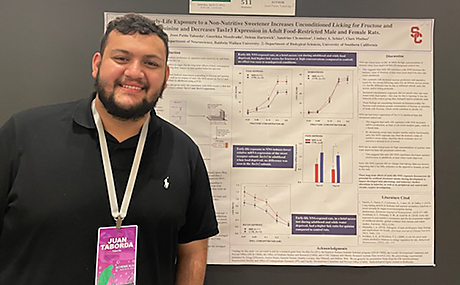 It
was
a
breakthrough
moment
for
BW
senior
Juan
Pablo
Taborda
Bejarano
'22
as
he
took
the
next
step
in
his
research
project
and
traveled
to
the
University
of
Southern
California
to
focus
on
the
effect
consuming
artificial
sweeteners
in
childhood
has
on
taste
later
in
life.
It
was
a
breakthrough
moment
for
BW
senior
Juan
Pablo
Taborda
Bejarano
'22
as
he
took
the
next
step
in
his
research
project
and
traveled
to
the
University
of
Southern
California
to
focus
on
the
effect
consuming
artificial
sweeteners
in
childhood
has
on
taste
later
in
life.
For the neuroscience-biology major, it was a pinnacle experience that brought together his four years of undergraduate study with his career goal. It was a journey that started in his hometown of Bogotá, Colombia, and spanned 2,583 miles to BW.
As Taborda Bejarano prepares to graduate in May and attend the Medical College of Wisconsin to pursue a Ph.D. in neuroscience, he is one example of how BW's hands-on approach to research enables aspiring graduate and medical school students to receive acceptance at top universities.
The prestigious opportunity began his first year at BW when he became a lab assistant for Dr. Clare Mathes, department chair and associate professor of neuroscience. He worked on a project alongside Mathes and neuroscience students Gaurikka Mendiratta '21 and Delenn Hartswick '21 to determine if drinking artificial sweeteners in childhood has an effect on taste-based behavior that lasts into adulthood.
 Upon
the
graduation
of
Mendiratta,
who
is
now
in
her
first
year
of
medical
school
at
the
University
of
Limerick,
Ireland,
and
Hartswick,
who
is
pursuing
a
Ph.D.
in
neuroscience
at
Georgia
State
University,
Taborda
Bejarano
continued
and
expanded
the
research
as
a
BW
summer
scholar
in
2021
and
later
for
independent
thesis
work.
Upon
the
graduation
of
Mendiratta,
who
is
now
in
her
first
year
of
medical
school
at
the
University
of
Limerick,
Ireland,
and
Hartswick,
who
is
pursuing
a
Ph.D.
in
neuroscience
at
Georgia
State
University,
Taborda
Bejarano
continued
and
expanded
the
research
as
a
BW
summer
scholar
in
2021
and
later
for
independent
thesis
work.
Through Mathes, he connected with Dr. Lindsey Schier of the department of biological sciences at the University of Southern California, a top-tier research school. Schier's lab focuses on how the chemical constituents of foods and fluids are sensed, processed in the brain and channeled to behavioral outputs. Mathes and Schier, who have similar research interests, have been collaborating since 2018.
During winter break of this year, Taborda Bejarano traveled to Los Angeles to further his research in Schier's lab. The trip was funded, in part, by an external grant from Nu Rho Psi, the National Honor Society in Neuroscience, which was awarded to Taborda Bejarano. It was a monumental experience both personally and professionally for Taborda Bejarano.
 "My
goal
for
this
experience
was
to
learn
new
techniques
and
further
my
real-life
experience
about
how
a
lab
functions.
I
now
know
what
a
research-driven
institution
looks
like,"
he
explained.
"My
work
in
the
lab
of
Dr.
Schier,
our
collaborator,
was
exciting
because
my
objective
after
graduation
is
to
go
to
graduate
school
and
continue
doing
research
in
a
professional
manner."
"My
goal
for
this
experience
was
to
learn
new
techniques
and
further
my
real-life
experience
about
how
a
lab
functions.
I
now
know
what
a
research-driven
institution
looks
like,"
he
explained.
"My
work
in
the
lab
of
Dr.
Schier,
our
collaborator,
was
exciting
because
my
objective
after
graduation
is
to
go
to
graduate
school
and
continue
doing
research
in
a
professional
manner."
His time in the lab was a success. Not only did it correlate to top-level graduate work and have consequential findings, but Taborda Bejarano will present his research at the national conference of the Association for Chemoreception Sciences this month (with Mendiratta and Hartswick as authors). The team also hopes to submit the work for peer-reviewed publication in a scientific journal.
Mathes, who studies the link between taste-based physiology and behaviors, is hopeful that Taborda Bejarano's findings could lead to real-world application that can affect dieticians, nutritionists and families.
 "A
lot
of
research
suggests
too
much
sugar
isn't
good
for
kids.
It
can
lead
to
weight
gain
and
even
obesity,
increase
tooth
decay,
and
it
may
even
contribute
to
poor
attention
and
memory
issues
that
last
into
adulthood,"
stated
Mathes.
"A
lot
of
research
suggests
too
much
sugar
isn't
good
for
kids.
It
can
lead
to
weight
gain
and
even
obesity,
increase
tooth
decay,
and
it
may
even
contribute
to
poor
attention
and
memory
issues
that
last
into
adulthood,"
stated
Mathes.
"Diet beverages, which contain no sugar, get their sweetness from non-nutritive artificial sweeteners. These additives work on taste buds in a way similar to nutritive sugar, so our brain tells us, 'this tastes sweet,'" she said.
"While having kids drink beverages that contain artificial sweeteners prevents them from consuming sugar, we don't know the effects those artificial sweeteners might have later in life when those former children choose for themselves what to eat and drink," Mathes pointed out.
"For example, we wondered what an adult might be more likely to drink if, as a kid, that person only had diet beverages. Our study suggests, at least in a non-human model, that consuming artificial sweetener daily during childhood and adolescence might make fructose seem super tasty once adulthood is reached," continued Mathes.
"Juan's work in Dr. Schier's lab took our behavioral findings a step further as he found that drinking artificial sweeteners daily resulted in decreased levels of one of the elements in taste buds needed to taste sweetness," she noted.
"To put that in human context, this might mean that drinking a lot of artificial sweeteners as a kid might change how their taste buds work, such that when these kids grow up, they like sugar even more," she explained.
"If
we
look
at
dietary
and
nutritional
considerations,
then
perhaps
adults
who
like
sugar
more
than
normal
would
be
more
likely
to
consume
greater
quantities
of
it
and
could
experience
potential
detriments
like
obesity.
For
families,
perhaps
the
take-home
message
of
this
research
is
that
giving
kids
water
to
drink
instead
of
diet
beverages
or
sugared
drinks
might
be
the
safest
course
of
action,"
she
concluded.
Note: According to The Carnegie Classification of Institutions of Higher Education®, an R1 school is a doctoral University with very high research activity.